Music is big business and could provide you with a steady stream of big profits if you make the right connections and know what your audienceneeds.& ...
You might consider targeting a niche, such as classic rock, new releases, or country music.
We earn commissions if you shop through the links below. Read more
Written by: Carolyn Young
Carolyn Young is a business writer who focuses on entrepreneurial concepts and the business formation. She has over 25 years of experience in business roles, and has authored several entrepreneurship textbooks.
Edited by: David Lepeska
David has been writing and learning about business, finance and globalization for a quarter-century, starting with a small New York consulting firm in the 1990s.
Published on April 23, 2023
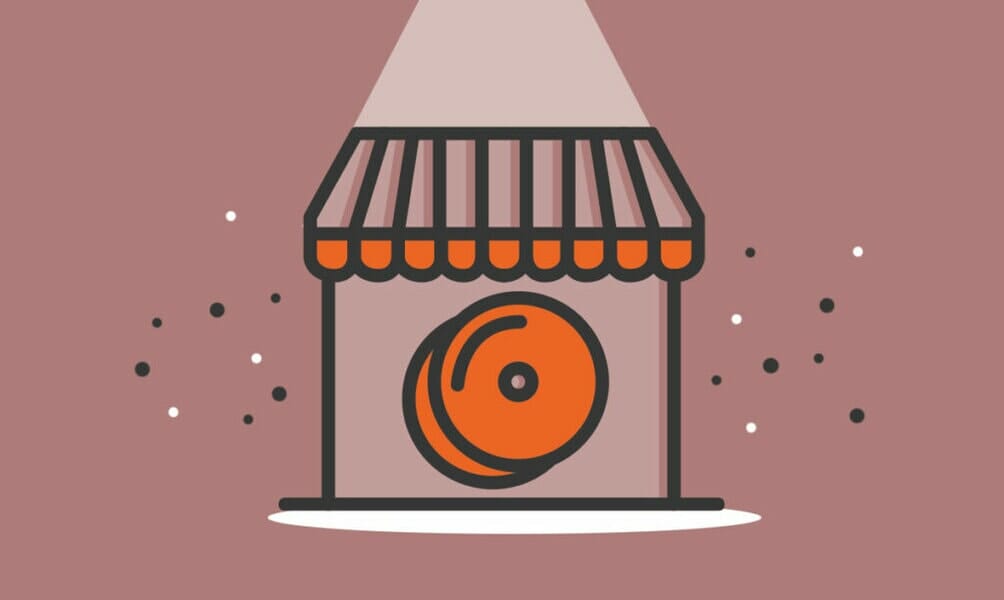
Investment range
$35,900 - $72,800
Revenue potential
$146,000 - $292,000 p.a.
Time to build
3 – 6 months
Profit potential
$36,500 - $73,000 p.a.
Industry trend
Declining
Commitment
Full-time
Here are the most important factors to consider when you want to start a record store:
You May Also Wonder:
Is a record store profitable?
A record store can be profitable if you pick the right concept for your market and find a good location. You’re not going to make a fortune, but you can make a decent living if you’re successful.
What is the growth potential of a record store?
A record store is somewhat limited in growth potential since the industry is still declining. You can, however, increase your revenue by offering more products, such as turntables, posters, and music memorabilia.
What type of business is a record store?
A record store falls into the pre-recorded tape, compact disc, and record stores industry which is NAICS code 45122. In more general terms, it falls into the retail category.
Can you start a record store on the side?
Record stores are not hugely profitable, so it’s not likely to be worthwhile to have it as a side business. However, you can hire employees and a manager so that it doesn’t take a huge amount of your time.
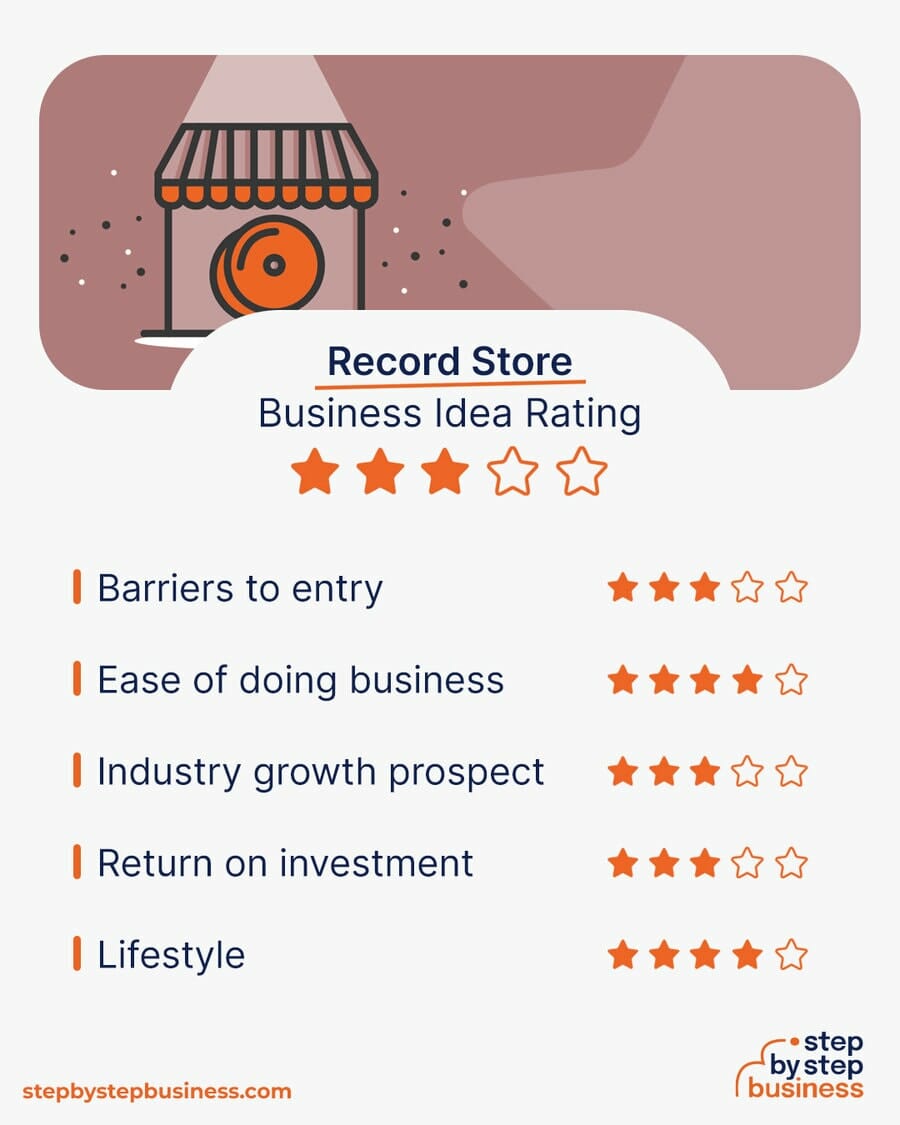

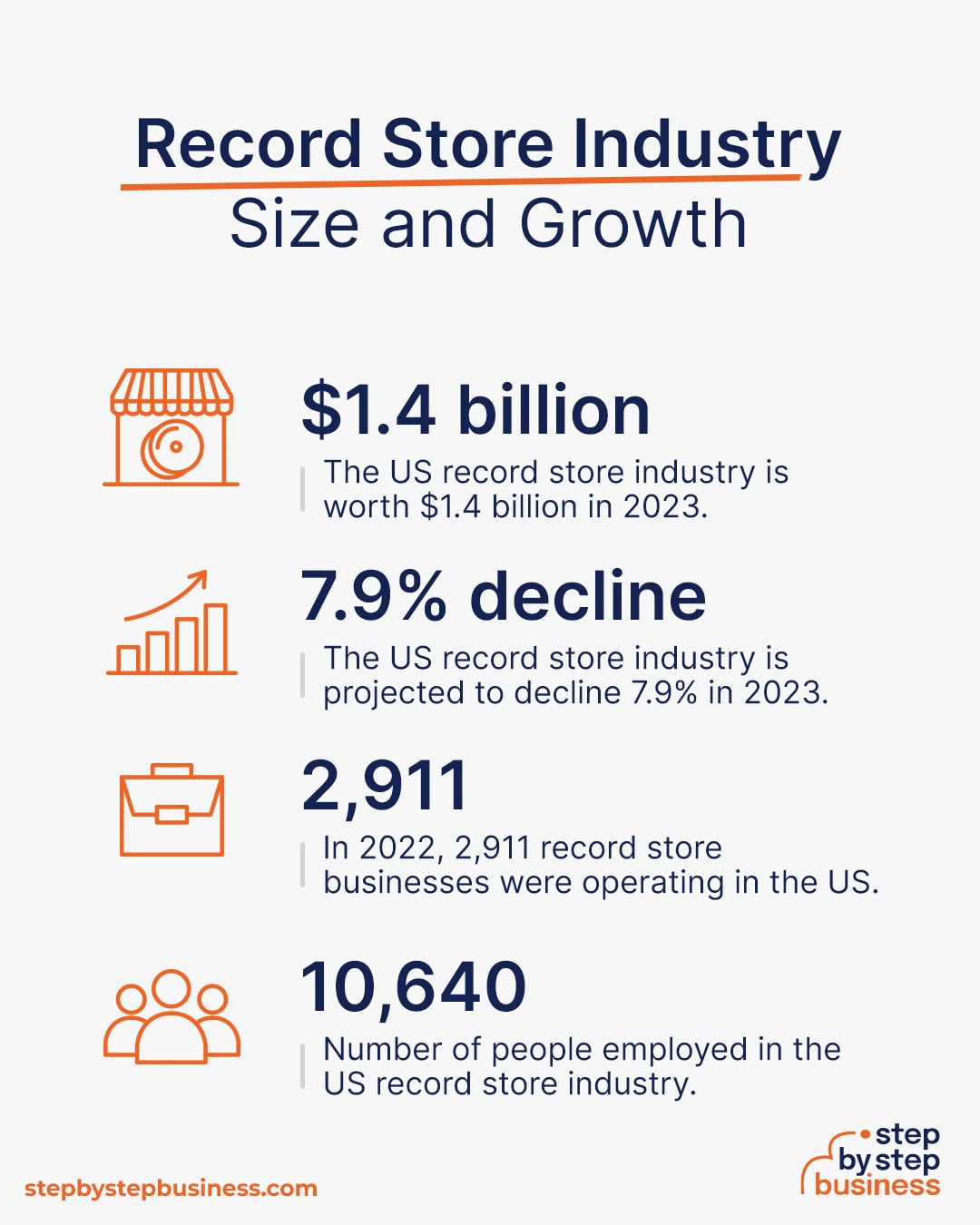
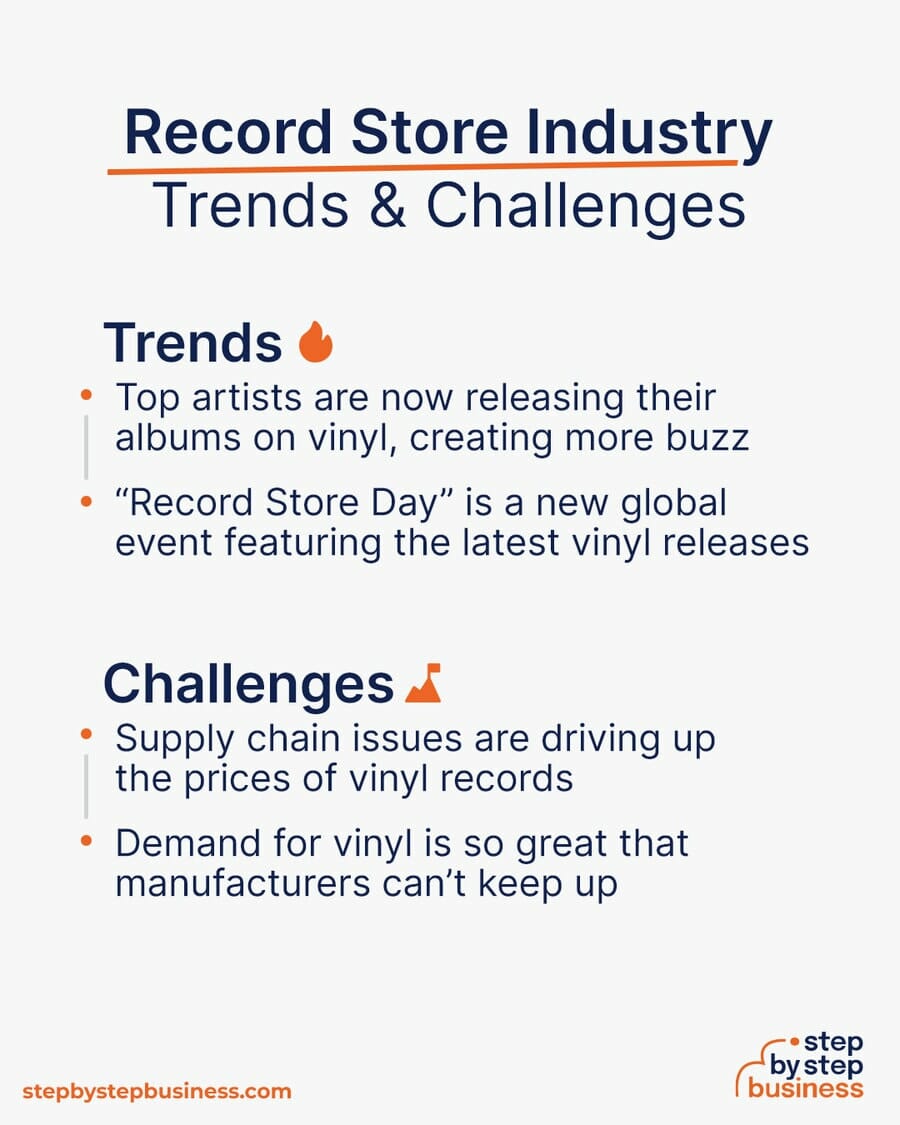
Trends
Challenges
Startup costs for a record store range from $35,000 to $70,000. Costs include the space rental and preparation and a starting inventory.
You’ll need a handful of items to successfully launch your record store business, including:
| Start-up Costs | Ballpark Range | Average |
|---|---|---|
| Setting up a business name and corporation | $100 - $500 | $300 |
| Business licenses and permits | $200 - $300 | $250 |
| Insurance | $100-$500 | $300 |
| Website | $200 - $1,000 | $600 |
| Initial Marketing Budget | $300 - $500 | $400 |
| Space rental and preparation | $10,000 - $20,000 | $15,000 |
| Inventory | $25,000 - $50,000 | $37,500 |
| Total | $35,900 - $72,800 | $54,350 |
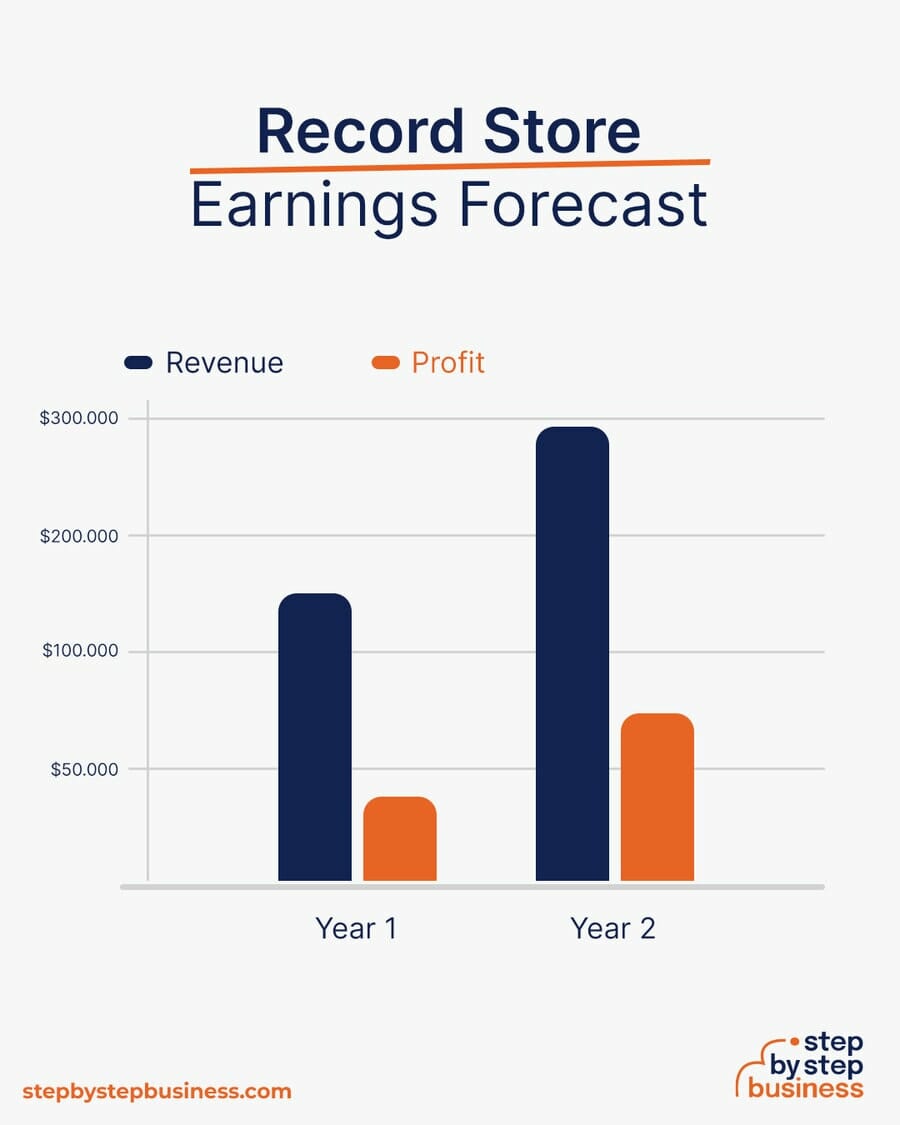
Your records should sell at an average of $20 each, although some new records and vintage records may sell for more. Your profit margin should be about 25%.
In your first year or two, you might sell 20 records a day, bringing in $146,000 in revenue. This would mean more than $36,000 in profit, assuming that 25% margin.
As you gain traction, sales could climb to 40 records a day. With annual revenue of $292,000, you’d make a tidy profit of $73,000.
There are a few barriers to entry for a record store. Your biggest challenges will be:

Now that you know what’s involved in starting a record store, it’s a good idea to hone your concept in preparation to enter a competitive market.
Market research could give you the upper hand even if you’ve got the perfect product. Conducting robust market research is crucial, as it will help you better understand your customers, your competitors, and the broader business landscape.
Research record stores in your area and online to examine their products, price points, and what sells best.
This should identify areas where you can strengthen your business and gain a competitive edge to make better business decisions.
You’re looking for a market gap to fill. For instance, maybe the local market is missing a shop that has listening stations or specializes in vintage albums.
You might consider targeting a niche, such as classic rock, new releases, or country music.
This could jumpstart your word-of-mouth marketing and attract clients right away.
You might consider specializing in a specific kind of music, such as classical or rock, or offering the widest possible variety along with new releases. You could also sell vinyls, turntables, CDs, posters, and other music merchandise.
The average record sells for $20, but your prices should be based on market prices as well as your cost to purchase the records and your other costs.
Once you know your costs, use this Step By Step profit margin calculator to determine your mark-up and final price points. Remember, the prices you use at launch should be subject to change if warranted by the market.
Your target market will depend on the types of records you offer. If you offer new pop records, your target market will be a younger demographic who you can find on TikTok or Instagram. If you sell vintage records, Facebook might be your best bet.
Choosing a record store location requires careful consideration of several factors.
First, research the demographics of potential areas to ensure a sufficient number of target customers.
Second, ensure the location is easily accessible with good visibility to attract both foot and vehicular traffic.
Third, evaluate the competition in the area; proximity to similar businesses can either boost or hinder sales.
Fourth, consider the rent or lease costs to ensure they align with your budget.
Lastly, assess the space for its layout and size, ensuring it can comfortably house your inventory and provide a pleasant shopping experience.
You’ll need to rent out a space for your store, preferably in an area where you’ll find your target market. You can find commercial space to rent in your area on sites such as Craigslist, Crexi, and Instant Offices.

Here are some ideas for brainstorming your business name:
Once you’ve got a list of potential names, visit the website of the US Patent and Trademark Office to make sure they are available for registration and check the availability of related domain names using our Domain Name Search tool. Using “.com” or “.org” sharply increases credibility, so it’s best to focus on these.
Finally, make your choice among the names that pass this screening and go ahead and reserve your business name with your state, start the trademark registration process, and complete your domain registration and social media account creation.
Your business name is one of the key differentiators that sets your business apart. Once you pick a name, reserve it and start with the branding, it’s hard to switch to a new name. So be sure to carefully consider your choice before moving forward.
Here are the key components of a business plan:

If you’ve never created a business plan, it can be an intimidating task. You might consider hiring a business plan specialist to create a top-notch business plan for you.
Registering your business is an absolutely crucial step — it’s the prerequisite to paying taxes, raising capital, opening a bank account, and other guideposts on the road to getting a business up and running.
Plus, registration is exciting because it makes the entire process official. Once it’s complete, you’ll have your own business!
Your business location is important because it can affect taxes, legal requirements, and revenue. Most people will register their business in the state where they live, but if you are planning to expand, you might consider looking elsewhere, as some states could offer real advantages when it comes to record stores.
If you’re willing to move, you could really maximize your business! Keep in mind, it’s relatively easy to transfer your business to another state.
Business entities come in several varieties, each with its pros and cons. The legal structure you choose for your record store will shape your taxes, personal liability, and business registration requirements, so choose wisely.
Here are the main options:

We recommend that new business owners choose LLC as it offers liability protection and pass-through taxation while being simpler to form than a corporation. You can form an LLC in as little as five minutes using an online LLC formation service. They will check that your business name is available before filing, submit your articles of organization, and answer any questions you might have.
Choose Your State
The final step before you’re able to pay taxes is getting an Employer Identification Number, or EIN. You can file for your EIN online or by mail or fax: visit the IRS website to learn more. Keep in mind, if you’ve chosen to be a sole proprietorship you can simply use your social security number as your EIN.
Once you have your EIN, you’ll need to choose your tax year. Financially speaking, your business will operate in a calendar year (January–December) or a fiscal year, a 12-month period that can start in any month. This will determine your tax cycle, while your business structure will determine which taxes you’ll pay.
The IRS website also offers a tax-payers checklist, and taxes can be filed online.
It is important to consult an accountant or other professional to help you with your taxes to ensure you are completing them correctly.
Securing financing is your next step and there are plenty of ways to raise capital:

Bank and SBA loans are probably the best option, other than friends and family, for funding a record store business. You might also try crowdfunding if you have an innovative concept.

Starting a records store business requires obtaining a number of licenses and permits from local, state, and federal governments.
Federal regulations, licenses, and permits associated with starting your business include doing business as (DBA), health licenses and permits from the Occupational Safety and Health Administration (OSHA), trademarks, copyrights, patents, and other intellectual properties, as well as industry-specific licenses and permits.
You may also need state-level and local county or city-based licenses and permits. The license requirements and how to obtain them vary, so check the websites of your state, city, and county governments or contact the appropriate person to learn more.
You could also check this SBA guide for your state’s requirements, but we recommend using MyCorporation’s Business License Compliance Package. They will research the exact forms you need for your business and state and provide them to ensure you’re fully compliant.
This is not a step to be taken lightly, as failing to comply with legal requirements can result in hefty penalties.
If you feel overwhelmed by this step or don’t know how to begin, it might be a good idea to hire a professional to help you check all the legal boxes.
Before you start making money, you’ll need a place to keep it, and that requires opening a bank account.
Keeping your business finances separate from your personal account makes it easy to file taxes and track your company’s income, so it’s worth doing even if you’re running your record store business as a sole proprietorship. Opening a business bank account is quite simple, and similar to opening a personal one. Most major banks offer accounts tailored for businesses — just inquire at your preferred bank to learn about their rates and features.
Banks vary in terms of offerings, so it’s a good idea to examine your options and select the best plan for you. Once you choose your bank, bring in your EIN (or Social Security Number if you decide on a sole proprietorship), articles of incorporation, and other legal documents and open your new account.
Business insurance is an area that often gets overlooked yet it can be vital to your success as an entrepreneur. Insurance protects you from unexpected events that can have a devastating impact on your business.
Here are some types of insurance to consider:


As opening day nears, prepare for launch by reviewing and improving some key elements of your business.
Being an entrepreneur often means wearing many hats, from marketing to sales to accounting, which can be overwhelming. Fortunately, many websites and digital tools are available to help simplify many business tasks.
You may want to use industry-specific software, such as Lightspeed, Vend, or RetailPro, to manage your inventory, purchases, sales, and online store integrations.
Website development is crucial because your site is your online presence and needs to convince prospective clients of your expertise and professionalism. You can create your own website using services like WordPress, Wix, or Squarespace. This route is very affordable, but figuring out how to build a website can be time-consuming. If you lack tech-savvy, you can hire a web designer or developer to create a custom website for your business.
Your customers are unlikely to find your website, however, unless you follow Search Engine Optimization (SEO) practices. SEO will help your website appear closer to the top in relevant search results, a crucial element for increasing sales.
Make sure that you optimize calls to action on your website. Experiment with text, color, size, and position of calls to action such as “Buy Now” or “Order”. This can sharply increase purchases.
Here are some powerful marketing strategies for your future business:

Unique selling propositions, or USPs, are the characteristics of a product or service that sets it apart from the competition. Customers today are inundated with buying options, so you’ll have a real advantage if they are able to quickly grasp how your record store meets their needs or wishes. It’s wise to do all you can to ensure your USPs stand out on your website and in your marketing and promotional materials, stimulating buyer desire.
Global pizza chain Domino’s is renowned for its USP: “Hot pizza in 30 minutes or less, guaranteed.” Signature USPs for your record shop could be:
You may not like to network or use personal connections for business gain. But your personal and professional networks likely offer considerable untapped business potential. Maybe that Facebook friend you met in college is now running a record store business, or a LinkedIn contact of yours is connected to dozens of potential clients. Maybe your cousin or neighbor has been working in record stores for years and can offer invaluable insight and industry connections.
The possibilities are endless, so it’s a good idea to review your personal and professional networks and reach out to those with possible links to or interest in record stores. You’ll probably generate new customers or find companies with which you could establish a partnership.

You will likely need workers to fill various roles. Potential positions for a record store business include:
At some point, you may need to hire all of these positions or simply a few, depending on the size and needs of your business. You might also hire multiple workers for a single role or a single worker for multiple roles, again depending on need.
Free-of-charge methods to recruit employees include posting ads on popular platforms such as LinkedIn, Facebook, or Jobs.com. You might also consider a premium recruitment option, such as advertising on Indeed, Glassdoor, or ZipRecruiter. Further, if you have the resources, you could consider hiring a recruitment agency to help you find talent.

Vinyl has made one of the biggest comebacks in the history of analog products – it’s almost as crazy as everybody using the abacus again! But this shift represents a major opportunity for music lovers and vinyl buffs, so maybe it’s time to follow your dream and go vinyl.
You’ve learned the ins and outs of the business, so now you’re ready to roll up your sleeves and open your wildly successful vinyl record store.

Published on November 4, 2022
Music is big business and could provide you with a steady stream of big profits if you make the right connections and know what your audienceneeds.& ...
Read Now

Published on July 13, 2022
Let the good times roll! With entertainment outlets now open and people coming together for all kinds of celebrations, the entertainment industry is ...
Read Now

Published on June 30, 2022
Want to express your creativity and be your own boss? There are many creative business ideas out there that can help you check both boxes, and makeg ...
Read Now
No thanks, I don't want to stay up to date on industry trends and news.
Comments